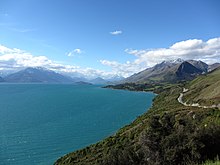Mnesarchaea paracosma
| Mnesarchaea paracosma | |
|---|---|

| |
| Scientific classification | |
| Domain: | Eukaryota |
| Kingdom: | Animalia |
| Phylum: | Arthropoda |
| Class: | Insecta |
| Order: | Lepidoptera |
| Family: | Mnesarchaeidae |
| Genus: | Mnesarchaea |
| Species: | M. paracosma
|
| Binomial name | |
| Mnesarchaea paracosma | |
Mnesarchaea paracosma is a species of primitive moths in the family Mnesarchaeidae.[1] It is endemic to New Zealand and can be found in the Kaikōura, mid and south Canterbury, MacKenzie, Otago Lakes, Central Otago, Dunedin, Fiordland and Southland areas. M. paracosma lives in a wide variety of habitats including tussock grasslands, shrubland, and damp native beech or podocarp forests, at a range of altitudes from around sea-level up to 1200 m. Adults of this species are on the wing from October to February and are day flying, although they are attracted to light at night.
Taxonomy
[edit]This species was first described by Edward Meyrick in 1885.[2] The male lectotype specimen, collected by Meyrick at Lake Wakatipu on the 15 December 1882, is held at the Natural History Museum, London.[3]
Description
[edit]

Meyrick described the species as follows:
Forewings yellowish-ochreous, with a wedge-shaped whitish streak from middle of costa, and some irregular dark fuscous suffusions.[2]
Hudson went on to give a more detailed description in his 1928 publication The butterflies and moths of New Zealand.[4] He described the species as follows:
The expansion of the wings is considerably under 3⁄8 in. The forewings are elliptical, pale ochreous-golden with two whitish transverse bands; the first at 1⁄2 strongly oblique almost reaching the tornus, the second at 3⁄4 nearly straight; there are a few faint brownish scales on the costa near the base and on the fold; a conspicuous patch of darker scales in the disc before the middle; several irregular elongate patches near the outer edge of the first transverse band and a very dense patch of brownish scales on the apical area; the cilia are golden-ochreous mixed with brownish scales near the apex. The hind-wings are grey with strong golden-purplish reflections; the cilia are brown-ochreous on the costa and grey on the termen.[4]
This species is small and coloured ochreous-brown, with brown, white and yellow patches over its forewings.[5] The antennae of M. paracosma are pale ochreous-yellow.[5] The male of this species has unusually shaped genitalia that assists with the identification of this species.[6]
Distribution
[edit]This species is endemic to New Zealand and can be found in the Kaikōura, mid and south Canterbury, MacKenzie, Otago Lakes, Central Otago, Dunedin, Fiordland and Southland areas.[7][5]
Habitat
[edit]M. paracosma lives in a wide variety of habitats including tussock grasslands, shrubland, and damp native beech or podocarp forests but are likely to be found near watercourses or moist areas as a result of their larvae existing on periphyton.[5] The species exists at a range of altitudes from around sea-level up to 1200 m.[5]
Behaviour
[edit]Adults of this species are on the wing from October to February.[5] Although this moth is normally day flying it is also attracted to light and has been collected via night light trapping.[5]
Host species
[edit]The larvae of M. paracosma require moist periphyton and are believed to feed on a variety of fungi, algae, mosses, liverworts and fern sporangia.[5]
References
[edit]- ^ a b "Mnesarchaea paracosma Meyrick, 1885". www.nzor.org.nz. 2021. Retrieved 2021-08-23.
- ^ a b Edward Meyrick (November 1885). "Descriptions of New Zealand Microlepidoptera. Gelechiadae. VIII. Tineina (part)". New Zealand Journal of Science. 2 (12): 591. Wikidata Q108097450.
- ^ Dugdale , J. S. (23 September 1988). "Lepidoptera - annotated catalogue, and keys to family-group taxa". Fauna of New Zealand. 14. Department of Scientific and Industrial Research: 55. doi:10.7931/J2/FNZ.14. ISSN 0111-5383. Wikidata Q45083134.
- ^ a b Hudson, G. V. (1928), The butterflies and moths of New Zealand, Illustrator: George Hudson, Wellington: Ferguson and Osborn Limited, p. 366, LCCN 88133764, OCLC 25449322, Wikidata Q58593286
- ^ a b c d e f g h Gibbs, George W.; Kristensen, Niels P. (28 May 2019). "Mnesarchaeidae (Insecta: Lepidoptera: Hepialoidea)" (PDF). Fauna of New Zealand (in English and Māori). 78. Lincoln: Manaaki Whenua – Landcare Research: 44–45. doi:10.7931/J2/FNZ.78. ISSN 0111-5383. Wikidata Q104802925. Archived from the original (PDF) on 19 February 2021.
- ^ Alfred Philpott (1927). "The Genitalia of the Mnesarchaeidae". Transactions and Proceedings of the New Zealand Institute. 57: 712. ISSN 1176-6158. Wikidata Q108225849.
- ^ "Mnesarchaea paracosma Meyrick, 1885". nztcs.org.nz. 2021. Retrieved 2021-08-23.
